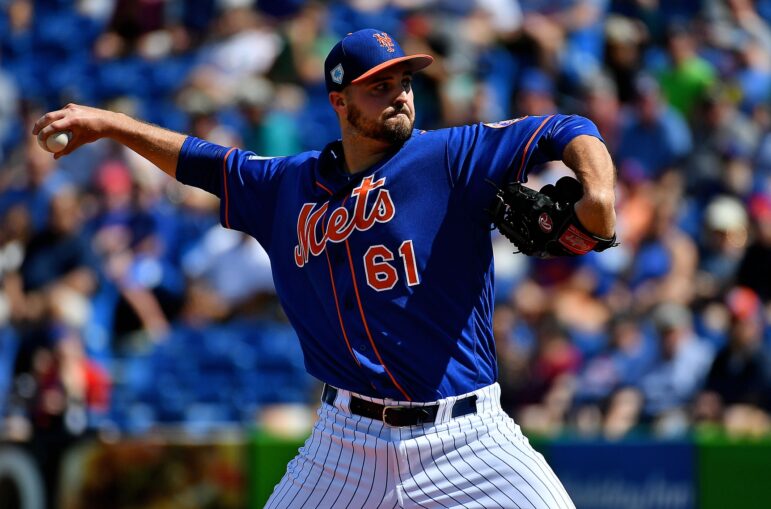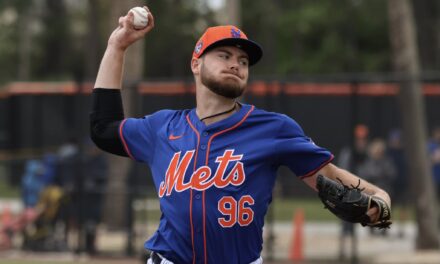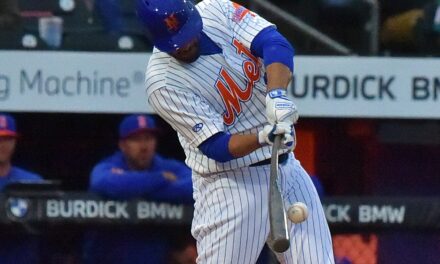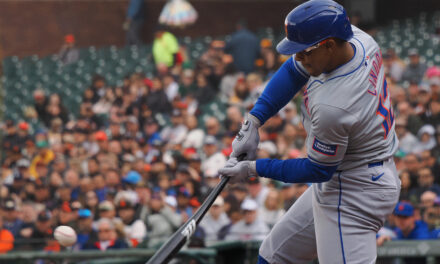
The Mets kicked off their first spring training game of the year against the Atlanta Braves, penciling in offseason acquisition Walker Lockett as the starter. Despite just three big-league starts and 15 total innings of experience with the San Diego Padres last season, Lockett has been preemptively tabbed by many as an option to shore up innings in the event that one of their regular starting pitchers misses time with an injury.
Prior to today’s contest, new assistant general manager Adam Guttridge told reporters, “with what he had done in prior years and think he can do pitch-mix wise with the fact he’s still relatively young, we feel like [Lockett’s] a guy who has a real chance to contribute.”
The 24-year old righty has no accolades as a minor leaguer, and with a 4.62 ERA and just 7.1 K/9 across his last three seasons in Triple-A, Lockett doesn’t necessarily profile as an ideal insurance arm. Nonetheless, his first appearance in a Met uniform definitely carries some promise.
Lockett struck out leadoff hitter Charlie Culberson to headline a three-up, three-down first inning that required just ten pitches, confidently establishing a sinking fastball on the inner part of the plate to both lefties and righties while topping out at 95 mph in an otherwise smooth 92-94 range.
The second inning presented some more challenges, though in Lockett’s defense, many were compounded by lackluster defense behind him, as Amed Rosario failing to complete a transfer on a double-play ball, first baseman Pete Alonso dropping a throw from Rosario one batter later, and Juan Lagares misfiring a relay throw on a sacrifice fly giving way to a pair of Atlanta runs.
Lockett’s fastball began missing upstairs, and he failed to get ahead with offspeed pitches, forcing him into a handful of 2-2 and 3-2 counts that wound up totaling 30 pitches on the inning. Lockett was pulled with two out in the second in favor of veteran left-hander Sean Burnett, who stopped the bleeding with a four-pitch flyout to left.
Lockett remained in positive spirits following his ouster, saying, “I try to turn that pressure into [my] favor. If they want to give me the ball the first game of the spring, that’s exciting.” Of the team’s decision to give him the ball for the opening game, he added “it gets me fired up. It’s easy to go out there and pitch motivated, with intent, when you have that kind of support behind you.”
Newark native and 2015 All-Star Héctor Santiago got his own chance to prove his worth as a depth piece in the third inning, following a path somewhat inverse to that of Lockett in terms of both the process and results. Santiago began by uncorking three wild and outside fastballs – the last of which hit leadoff batter Johan Camargo – and shortly thereafter walked outfielder Adam Duvall to put the Braves in business.
Santiago knuckled down, however, striking out third base prospect Austin Riley (ranked 43rd among MLB Pipeline‘s top 100 prospects) on three pitches (the last a perfectly-spotted inside fastball) and fooling Rafael Ortega into popping up a fastball off the plate to third for the second out. After hitting a second batter in catcher Alex Jackson to load the bases, Santiago managed to induce a flyout from young outfielder Cristian Pache (ranked the 68th best prospect by Pipeline), thus ending his inning – and afternoon – at an adventurous 26 pitches.
Immediately after the inning, Santiago told SNY’s Steve Gelbs “It’s the mentality. I got one inning, or maybe two, to go after them, and my job is to put a zero up – or two, if I have to. As a starter, you try to conserve some stuff. You try to conserve velocity and pitch count to get deep into a game, and that’s hard. I’m not that kinda guy. I like to go after you with ‘here it is, try to hit it…'”
The slow start, but prompt recovery in Santiago’s outing tie into the mindset well, particularly in terms of adaptability and confidence, which he echoed in a separate question relating to his experience out of the bullpen with the Chicago White Sox last season.
“I had a really good season,” Santiago said. “I knew my role. That was a good part of last season as a reliever.”
Whether or not the lefty winds up finding extended time as a starter this spring will hinge on his ability to control his fastball and retool a changeup that, at 7.3 runs above average in 2017 versus 6.2 below in 2018, could decide where he stands relative to other pitchers expected to spend time in the minors this year.















